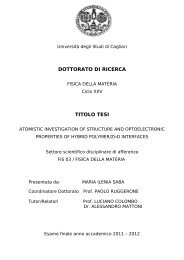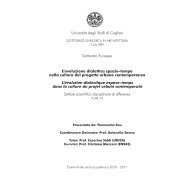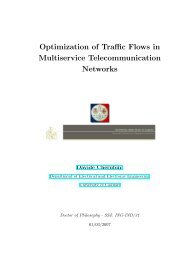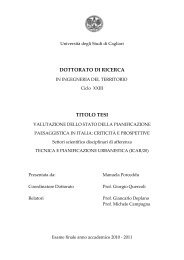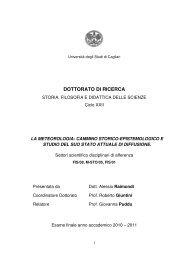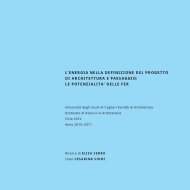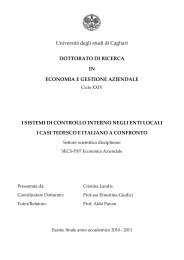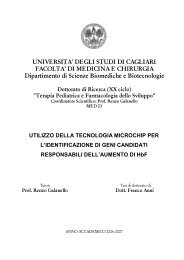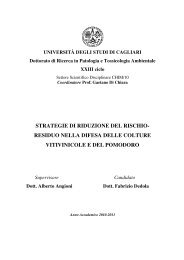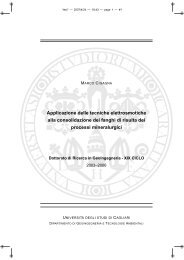The only truly alien planet is Earth. - UniCA Eprints - Università degli ...
The only truly alien planet is Earth. - UniCA Eprints - Università degli ...
The only truly alien planet is Earth. - UniCA Eprints - Università degli ...
Create successful ePaper yourself
Turn your PDF publications into a flip-book with our unique Google optimized e-Paper software.
elementi restano separati. O meglio, più prec<strong>is</strong>amente, un processo di sovrapposizione e fusione ha<br />
luogo, ma soltanto tra macchina e animale, considerato che ciò che ne resta fuori è proprio la<br />
componente umana più profonda, quella spirituale 345 .<br />
In definitiva, secondo la Vidal, il romanzo non sarebbe altro che una rappresentazione<br />
simbolica della società sull’orlo del collasso, in quel momento storico - gli anni Settanta - dominato<br />
dall’ossessione per la violenza, le macchine, la ripetitività dell’attività sessuale, etc 346 . A partire<br />
dagli anni Sessanta, come illustra la citazione di icone mediatiche quali Elizabeth Taylor, Marilyn<br />
Monroe o John Fitzgerald Kennedy in <strong>The</strong> Atrocity Exhibition, la diffusione dei mass media e la<br />
conseguente crescente enfatizzazione della violenza ne fa un prodotto commerciale, una vera e<br />
propria merce da consumare, una componente di rilievo dell’industria dell’intrattenimento. Il<br />
legame tra violenza e consum<strong>is</strong>mo sarà l’asse portante dell’ultimo romanzo di Ballard, Kingdom<br />
Come. Nel corso di un’interv<strong>is</strong>ta rilasciata da Ballard a John Gray, Emeritus Professor of European<br />
Thought alla London School of Economics, quest’ultimo condivide l’idea che la violenza sia una<br />
caratter<strong>is</strong>tica della società, individuando lucidamente le radici dell’uso che ne fa Ballard nella sua<br />
narrativa, e in Crash in particolare, nell’atmosfera che l’autore ha v<strong>is</strong>suto nei suoi primi quindici<br />
anni di vita a Shanghai:<br />
What strikes me about many of your writings <strong>is</strong> that you see a subtext of violence, you see violence<br />
itself, either dream violence or actual violence, as being woven into very modern societies. In other words, as<br />
we get more modern, as we get more rational, it's not the case that violence d<strong>is</strong>appears, it's rather the case<br />
that it emerges suddenly, like the bombing of a supermarket, or in the form of serial killers, or in the form,<br />
maybe, of the styl<strong>is</strong>ed violence that permeates the media. So it seems that Shanghai embodied that, that it<br />
was a kind of augery of the modern society we live in. […] And you've gone a little further in your more<br />
recent work. In Crash, for example, you pointed to the fantasies which are embodied in the private motorcar.<br />
That's to say not <strong>only</strong> the fantasies, or, to some extent, even the reality of personal freedom, going where you<br />
want, doing what you want, when you want it, and not being dependant on other people, but also the<br />
fantasies of release in sudden death, of an almost erotic relationship with the car in which you're travelling.<br />
Right through your writings <strong>is</strong> the theme of the way the most basic, and even unconscious, human needs,<br />
emotions and instincts interact with our most modern and innovative technologies, including those in<br />
everyday life like the motor car 347 .<br />
Negli ultimi dieci anni della vita di Ballard, lui e John Gray sono stati legati da una stima<br />
reciproca, ma soprattutto da alcune opinioni comuni, come l’idea che la violenza faccia parte del<br />
patrimonio genetico dell’umanità, in contrasto con l’idea illumin<strong>is</strong>ta che la razionalità sia il fulcro<br />
345 «<strong>The</strong>y [I protagon<strong>is</strong>ti di Crash] do not become one with each other and nature as a greater whole. Instead they<br />
experience unification with the machine and the complex and styl<strong>is</strong>ed geometry of technology. Ballard‘s adapted man<br />
then <strong>is</strong> the product of a fusion of machine and animal, leaving out the human.» Ivi.<br />
346 «Though Baudrillard insinuates that Crash lacks “all finality and critical negativity” and <strong>is</strong> even beyond the critical<br />
judgement of its own author [Baudrillard, ‘Two Essays,‘ 1991, p. 319], I would rather agree with Brottmann and<br />
Sharrett that both as film and novel it “<strong>is</strong> a symbolic representation of a society obsessed with violence, brand names,<br />
destruction, machines, time, boredom, and repetitive sex, a society on the cusp of collapse into nihil<strong>is</strong>tic dereliction and<br />
d<strong>is</strong>aster” [Brottman and Sharrett, ‘End of the Road’, 1999, p. 282].» Ivi.<br />
347 John Gray, “Gray interviews Ballard”, BBC Radio 4, 21/09/2000.<br />
- 105 -



